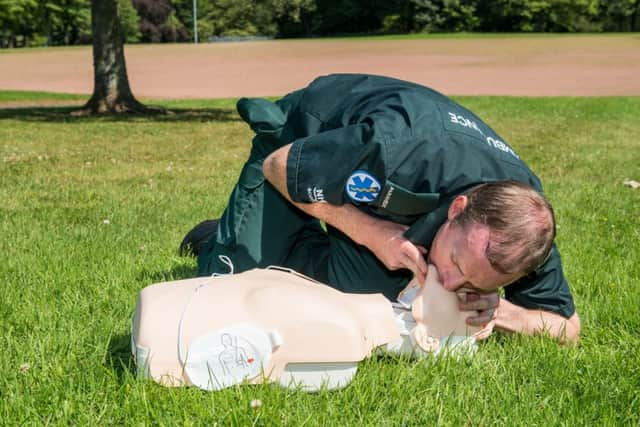Seven numbers you should know this week


50 PER CENT OF SCOTS LACK FIRST AID TRAINING
Research by St Andrew’s First Aid found that over half of Scots have no basic first aid training. And around 75 per cent of Scots would have no idea what to do if someone was suffering an attack.
The survey has highlighted the worryingly vast gap in the nation’s abilities in administering life-saving first aid skills
Advertisement
Hide AdAdvertisement
Hide AdThe figures were released by Scotland’s largest first aid charity to mark Scottish First Aid Week, which runs until November 29 and encourages members of the public to learn life-saving skills.
In 2013 there were 7,239 deaths in Scotland where coronary heart disease was the underlying cause.
POVERTY RATE FOR WORKING AGE SCOTS RISES TO 21 PER CENT
Young Scots are more likely to live in poverty than those aged over 65 due to a combination of unemployment, benefit sanctions and lack of affordable homes, a new report has found.
The poverty rate for those of working age has risen to 21 per cent, according to the 2015 social exclusion report by the Joseph Rowntree Foundation.
This points to a further problem for young adults: being better qualified is less of a guarantee of a better paid job than in the past
Joseph Rowntree Foundation
Young adults under 30 are now at a higher risk than any other age group of experiencing poverty in Scotland – the only age group to have seen an increase over the last 10 years.
HALF OF SCOTS BLAME TIREDNESS ON THEIR RELUCTANCE TO SOCIALISE
One in three adults admit they falsely accept invitations, while half blame tiredness for their apparent reluctance to socialise.
Advertisement
Hide AdAdvertisement
Hide Ad84 per cent of people think it’s easier to cancel plans because of technology, using text, email and messaging apps to do so.
Half of Scots are using the “too tired” excuse, because they would just rather have a night in.
TWEED FISHING WORTH £24m
Fishing on the river and its tributaries contributes around £24m to the economy, according to SQE, up from £17.9m nine years ago. Employment on the river has also risen, up from 490 full time equivalent posts to 513.
The number of rod days let on the river increased over the same period by 6.5 per cent, up from 35,876 to 38,210.
The River Tweed Commission, the cross-Border body responsible for protecting the river which commissioned the research, has channelled research grants totalling £1.3m into the Tweed Foundation to study and manage the waterway over the past decade, with projects including the removal of invasive species which pose a threat to its native fishes.
A THIRD OF SCOTS EAT CHIPS AT LEAST TWICE A WEEK
Recent data shows that just under a third (31 per cent) of Scottish adults eat chips twice a week, with roughly similar proportions saying they eat cake at least twice a week (34 per cent). In comparison, just one in five (20 per cent) meet the five-a-day recommendations.
Men are considerably more likely to tuck into a plate of chips than women. Exactly a quarter of women (25 per cent) had chips more than once a week compared to well over a third of men (37 per cent), a much bigger difference than for other foods that are high in fat or sugar like biscuits, non-diet soft drinks and ice cream. For cakes, crisps, sweets and chocolate there was no discernible difference at all in consumption between men and women.
EDINBURGH JOB CREATION RATE UP 43.3 PER CENT
Three Scottish cities have made the UK’s top ten in terms of job creation.
Advertisement
Hide AdAdvertisement
Hide AdEdinburgh was close behind in second place, behind Leeds, with an increase of 43.3 per cent, while Dundee and Glasgow also made the top ten.
London did not make the cut, suggesting that employers are looking outside the UK capital when setting up business.
BOOKIES OFFER 2/1 ON A WHITE CHRISTMAS
Temperatures dropped as low as minus 6 degrees in parts of the UK over the weekend, with some areas above 150 metres experiencing snow for the first time this winter.
Traditionally, the definition of a white Christmas in the UK is “a single snowflake falling during the 24 hours of Christmas Day’ at the Met Office building in London” according to the Met office, but many bookmakers will now offer odds of Christmas day snow at a variety of locations across the country.
Ladbrokes are currently offering odds of 7/4 for Aberdeen, with Edinburgh and Glasgow at 2/1. Paddypower are offering 9/4 for Edinburgh and Glasgow.
